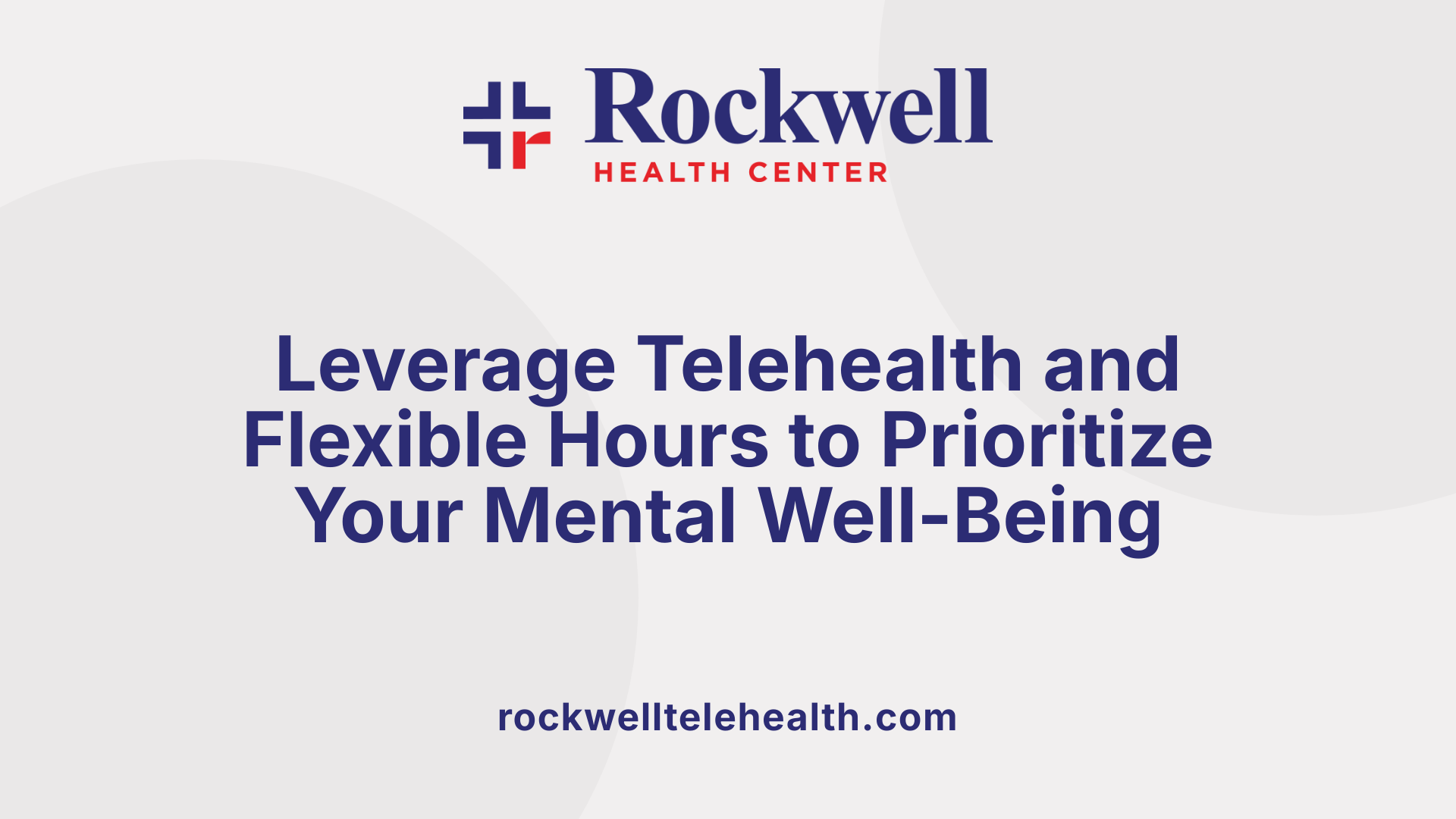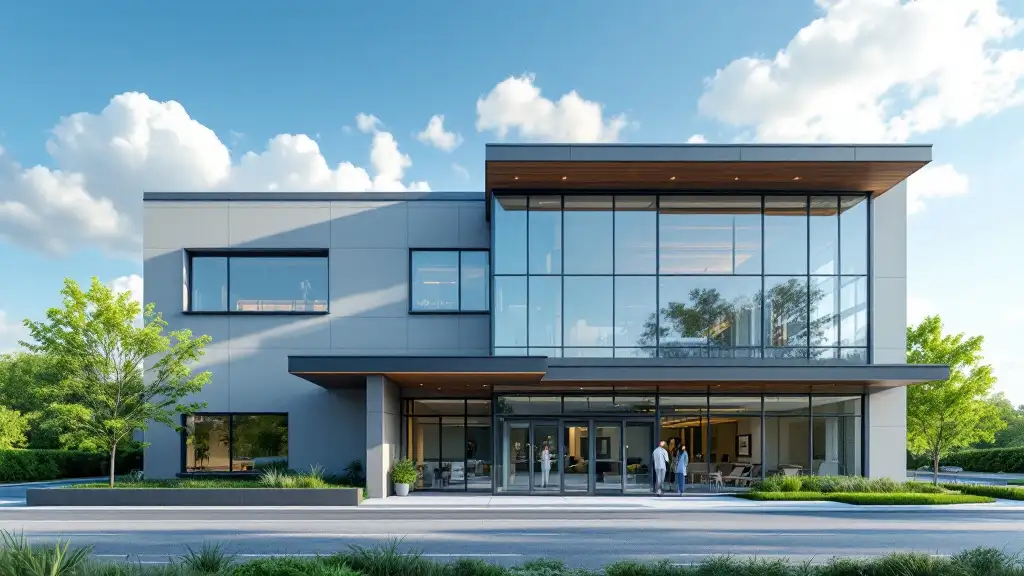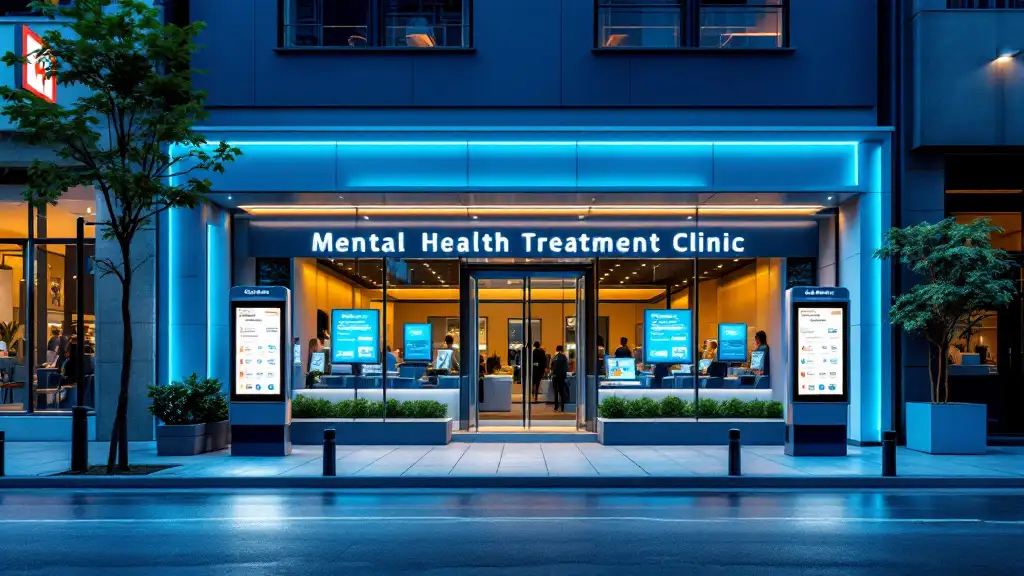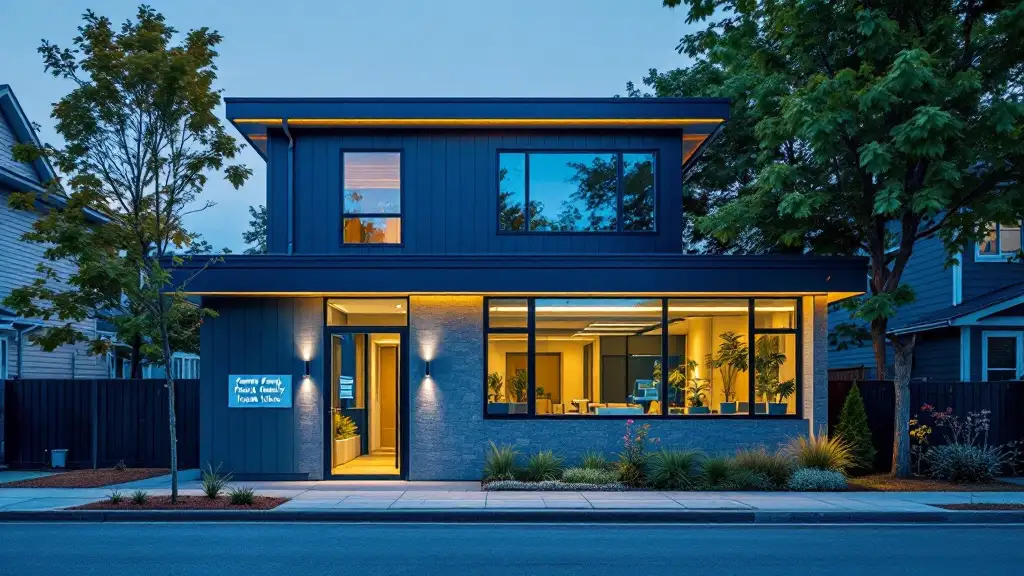Understanding Integrated Mental Health Counseling
In today’s fast-paced world, managing mental health alongside work, school, and family responsibilities can be overwhelming. Fortunately, recent developments in counseling provide flexible, specialized services tailored to diverse lifestyles and commitments. This article explores how mental health counseling can seamlessly integrate into your daily routine, supporting your well-being without disrupting your commitments.
Educational Pathways Supporting Diverse Life Domains

What does a Master’s in Counseling with an emphasis on school-based family counseling involve?
The Master of Science in Counseling program with a specialization in School-Based Family Counseling is designed to prepare students for a variety of roles in mental health and educational settings. This full-time program typically spans about two and a half to three years and emphasizes in-person, structured learning, primarily scheduled during evening hours to accommodate working students.
Students gain clinical skills similar to those of an independent marriage and family therapist, along with competencies requisite for effective school counseling. The curriculum focuses on therapy techniques, multicultural sensitivity with a social justice perspective, and evidence-based interventions applicable across different domains of life—family, school, and community.
A hallmark of this program is practical training through classroom videotaped practice and real-world fieldwork, enabling students to serve individuals, families, and groups effectively in various environments such as schools, clinics, and community agencies. Graduates are well-equipped to serve in settings that support mental health and educational success.
How does the program prepare students for multiple professional credentials?
Graduates of the program have a pathway to several respected professional credentials. These include:
- Pupil Personnel Services (PPS) credential — enabling school counselors to support students’ academic and social-emotional development.
- Advanced Authorization in Child Welfare and Attendance (CWA) — focusing on student attendance and welfare within schools.
- Licensed Marriage and Family Therapist (LMFT) — for those pursuing clinical mental health work with families and couples.
- Licensed Professional Clinical Counselor (LPCC) — emphasizing broader mental health practice including individual therapy.
This diversified credential structure allows professionals to tailor their careers across school environments, private practice, or broader mental health contexts.
What training in multicultural and social justice counseling is included?
Recognizing the importance of cultural competence in mental health work, the program embeds comprehensive training in multicultural conjoint family therapy and social justice issues. Students learn to navigate diverse cultural backgrounds and address inequalities that influence mental health outcomes. This training enhances their ability to provide equitable and sensitive care, ensuring they serve the needs of diverse populations effectively.
What is the structure and focus of this in-person, professional program?
The program’s structured approach prioritizes in-person learning to facilitate hands-on experience and peer interaction. Unlike online options, this face-to-face format ensures close mentorship, immediate feedback, and real-time practice that are critical in developing clinical competencies.
Admission is competitive, with about 24 spots available from over 300 applicants, favoring those with prior mental health experience. Applicants must hold a bachelor’s degree, maintain at least a 2.75 GPA in the last 60 units, and complete an interview with recommendation letters.
The training emphasizes the integration of mental health counseling into educational and community settings, preparing students to serve in environments like public clinics, residential facilities, schools, and private practice. After graduation, alumni are qualified to take licensure exams for MFT and related credentials, supporting their careers in diverse settings.
How do counseling specialists serve different aspects of life?
Counselors trained through this program work in several specialty roles:
- Professional counselors assist with career development, wellness, and mental health support.
- School and career counselors focus on social-emotional support, academic guidance, and post-secondary planning.
- Clinical mental health counselors provide psychotherapy for issues like stress, substance abuse, and relationship problems.
- Marriage and family therapists (MFTs) treat relational and systemic family issues, often through solution-focused approaches that are typically brief, around 12 sessions.
Research supports the effectiveness of MFTs, showing high client satisfaction—with over 98% rating therapy positively—and significant improvements in emotional health.
What career opportunities are available after completing this training?
Graduates are prepared for employment across a spectrum of settings:
| Setting | Role | Focus | Additional Details |
|---|---|---|---|
| Schools | School Counselor | Academic and social-emotional development | Supporting student success and well-being |
| Clinics and Hospitals | Mental Health Therapist | Mental health diagnosis and treatment | Diagnosing and managing mental health conditions |
| Private Practice | Licensed Therapist | Individual, couple, family therapy | Independent client work with variable specialties |
| Community Agencies | Counselor | Community mental health services | Focused on underserved populations |
| Residential Treatment | Group Facilitator | Family and individual therapy | Often working with youth or special cases |
The broad scope of these roles aligns with the program’s goal of serving the mental health needs of individuals and families across multiple settings.
How does the program prepare students for evolving healthcare delivery models?
The training adapts to current trends by including both traditional face-to-face and telehealth modalities. This prepares students for delivering services via online platforms, an increasingly prevalent practice in mental health care.
Alumni success stories highlight the practical application of their skills in public health initiatives and community-based programs, demonstrating the real-world impact of integrating mental health services into everyday environments.
What additional research resources help find mental health professionals catering to diverse lifestyles?
For those seeking professionals that cater to multifaceted lifestyles, several online platforms are recommended:
| Platform | Features | Ideal For | Additional Notes |
|---|---|---|---|
| Psychology Today | Directory with filters for specialties and session formats | General search | Extensive listing, client reviews |
| Zencare | vetted therapists, flexible options | Cost-effective and tailored care | Focus on matching with therapist styles |
| BetterHelp | Online counseling with licensed therapists | Telehealth preferences | Subscription-based service |
| TherapyDen | Curated therapist profiles with focus on diversity | Specialized needs | Emphasizes inclusivity |
| Open Path | Affordable therapy with sliding scales | Budget-conscious clients | Ideal for flexible, long-term therapy |
By leveraging these resources, individuals can find mental health professionals who understand and serve their unique lifestyles and needs.
Search phrase for more insights
To explore further, search for "Master of Science in Counseling with school-based family counseling specialization" to find detailed program descriptions, credential pathways, and career opportunities. This search will lead to comprehensive university websites and professional association pages expanding on the training and credentialing process.
Integrating Counseling into a Busy Lifestyle
 Balancing mental health care with a hectic schedule can seem daunting, but with effective strategies, it becomes more manageable. One of the most practical approaches is to schedule therapy sessions during flexible hours that align with your daily routine. Many mental health professionals now offer evening or weekend appointments, making it easier to fit sessions into work or school hours.
Balancing mental health care with a hectic schedule can seem daunting, but with effective strategies, it becomes more manageable. One of the most practical approaches is to schedule therapy sessions during flexible hours that align with your daily routine. Many mental health professionals now offer evening or weekend appointments, making it easier to fit sessions into work or school hours.
Another valuable option is utilizing telehealth and online counseling services. These platforms allow individuals to access therapy from the comfort of their homes or offices, reducing travel time and providing greater convenience. Online sessions can be scheduled with flexibility, accommodating even the busiest schedules.
Incorporating mindfulness and self-care techniques into daily routines can significantly enhance emotional resilience. Simple practices such as deep breathing exercises, short walks, or journaling help manage stress in real-time. These small, intentional activities can be integrated into breaks at work, transitions between classes, or while at home.
Building a supportive network with family, friends, or support groups offers vital emotional reinforcement. Sharing feelings and seeking encouragement from trusted individuals fosters a sense of connection and reduces feelings of isolation. Strong relationships also provide accountability and motivation for ongoing self-care.
Using micro-habits and reminders can serve as gentle prompts to prioritize mental wellness. Setting alarms or notifications for brief check-ins, stretching, or relaxation activities helps incorporate mental health practices into daily life. Over time, these small actions build a sustainable routine that promotes ongoing well-being.
To summarize, effective strategies for integrating mental health counseling into work, school, and family life include: scheduling therapy during convenient times, leveraging telehealth options, practicing daily mindfulness, cultivating a supportive social network, and utilizing incremental habits and reminders. These approaches help maintain mental wellness without disrupting busy schedules, making mental health care a seamless part of everyday life.
| Strategy | Description | Benefits |
|---|---|---|
| Flexible Scheduling | Evening, weekend, or varied hours to match routine | Increased accessibility |
| Telehealth and Online Counseling | Virtual therapy sessions from any location | Convenience, reduced commute |
| Daily Mindfulness Practices | Breathing exercises, journaling, short walks | Stress reduction, emotional clarity |
| Support Network | Family, friends, or support groups | Emotional resilience, encouragement |
| Micro-Habits and Reminders | Alarms, notifications, small daily wellness actions | Consistency, habit formation |
More information for effective scheduling and incorporating mental health support into busy lives can be found by searching phrases like "Strategies for accommodating mental health in busy schedules," which include tips on integrating wellness activities seamlessly into everyday routines.
Specialized Counseling Services for Diverse Needs
What are the different counseling specialties that support diverse needs across various aspects of life?
Counseling professions are incredibly diverse, designed to meet the wide-ranging needs of individuals, families, and communities. Marriage and family therapy (MFT) is a well-known specialty focused on resolving relational issues, managing life transitions, and improving overall family dynamics.
Beyond family and couples, there are numerous other specialties such as rehabilitation counseling, which assists people with disabilities in developing strategies for independent living. School counselors support students' academic success, social-emotional development, and career planning. Career counselors help individuals identify strengths and explore vocational opportunities.
Trauma and crisis counseling provide immediate support and longer-term healing for individuals experiencing psychological distress due to traumatic events. Substance abuse counseling addresses issues related to addiction and recovery, helping individuals find sustainable pathways to sobriety.
These specialties often overlap, allowing counselors to address multiple aspects of a person's life, whether it's emotional well-being, personal growth, or social functioning.
Marriage and family therapy for relationship and family issues
MFTs are trained to evaluate and treat mental and emotional disorders within the context of family systems. They typically hold a graduate degree, complete supervised clinical hours, and obtain licensure.
This therapy is problem-focused and usually brief, with an average of around 12 sessions. Therapists work with couples and families to improve communication, resolve conflicts, and manage life transitions such as divorce or aging.
Research shows that MFT is highly effective for issues like marital problems, depression, anxiety, child-parent conflicts, substance abuse, and chronic illness management. Clients often report high satisfaction, with over 98% rating therapy as good or excellent.
Rehabilitation, school, career, trauma, and substance abuse counseling
Rehabilitation counselors support people with disabilities, helping them achieve independence. School and career counselors aid students in academic, social, and vocational development.
Trauma counselors work with individuals and groups impacted by traumatic events, providing initial crisis intervention and long-term recovery support. Substance abuse counselors focus on helping individuals overcome addiction and develop healthier lifestyles.
These roles often involve multidisciplinary teamwork, integrating mental health insight within broader social and community services.
Support for multicultural and social justice-oriented therapy
Modern counseling emphasizes cultural humility and social justice. Therapists are trained to recognize and respect diverse cultural backgrounds, working to reduce disparities in mental health care.
Multicultural counseling involves understanding clients' cultural contexts, incorporating culturally appropriate interventions, and promoting equity.
Social justice-oriented therapy focuses on addressing societal inequalities that impact mental health, such as discrimination, poverty, and systemic oppression. Such approaches aim to empower marginalized groups and foster resilience.
Online and in-person modalities
Counseling services are delivered through various formats to meet different needs. Traditional in-person sessions provide direct, face-to-face interaction, essential for building rapport and assessing non-verbal cues.
In recent years, telehealth or online counseling has expanded access, especially for clients in remote areas or with mobility challenges. These virtual sessions utilize secure video platforms, offering flexibility and convenience.
Both modalities have proven effective, with research supporting the use of telehealth in mental health care. Counselors often blend in-person and online services to provide comprehensive, accessible support.
| Counseling Specialty | Main Focus | Typical Settings | Additional Notes |
|---|---|---|---|
| Marriage & Family Therapy | Relationship issues, family dynamics | Clinics, private practice, hospitals | Usually brief, solution-focused, ~12 sessions |
| Rehabilitation Counseling | Independence for persons with disabilities | Rehabilitation centers, community agencies | Emphasizes practical skills, social integration |
| School Counseling | Academic, social, career support for students | Schools, educational clinics | Critical for supporting youth development |
| Trauma & Crisis Counseling | Coping with recent traumatic events | Emergency centers, clinics | Focuses on acute intervention and ongoing support |
| Substance Abuse Counseling | Addiction management, recovery | Rehab centers, outpatient clinics | Often part of a multidisciplinary recovery team |
| Multicultural & Social Justice | Cultural humility, equity in mental health | Various counseling settings | Aims to reduce disparities and promote inclusivity |
Nearly all these specialties prepare professionals for licensure, such as the LMFT, LPCC, or other recognized credentials, ensuring quality and ethical standards across the profession.
In summary, counseling is a dynamic field with numerous specialties working across various settings. Whether in schools, clinics, or community agencies, these professionals aim to support individuals and families in achieving mental, social, and emotional well-being.
Benefits and Scope of Marriage and Family Therapy
What are the benefits of marriage and family therapy, and who can it help?
Marriage and family therapy (MFT) offers numerous advantages for individuals, couples, and families. It primarily focuses on improving communication and conflict resolution, which are essential for healthy relationships. By addressing relational dynamics, MFT helps strengthen bonds, foster mutual trust, and repair trust issues often rooted in shared family history.
MFT is effective in treating a variety of mental health concerns such as depression, anxiety, and behavioral problems, especially in children and adolescents. Therapists work to identify underlying issues and develop strategies for managing emotional and psychological challenges.
This type of therapy also supports diverse family structures and relationship types, including blended families, same-sex partnerships, and multigenerational households. The interventions are tailored to meet specific needs, promoting healthier interaction patterns and emotional resilience.
In addition to addressing mental health issues, MFT provides vital support during significant life transitions such as divorce, separation, death, or illness. It helps individuals and families navigate these changes with greater understanding and less conflict.
Client satisfaction in marriage and family therapy is notably high — over 98% of clients report therapy as good or excellent, and nearly 90% experience improvement in their emotional health after treatment. These positive outcomes underscore the effectiveness of MFT in fostering lasting change and overall well-being.
Improving communication and resolving conflicts
One of the core benefits of MFT is enhancing communication skills within relationships. Therapists teach constructive ways to express needs and concerns, reducing misunderstandings and fostering a healthier dialogue.
Conflict resolution strategies learned in therapy help parties find common ground, restore harmony, and develop cooperative problem-solving skills.
Addressing mental health issues like depression, anxiety, and behavioral problems
Marriage and family therapists are trained to identify and treat mental health disorders within the context of family systems. They provide psychotherapy that targets emotional distress, maladaptive behaviors, and relational difficulties.
Therapists use evidence-based interventions supporting emotional regulation, coping skills, and resilience-building.
Supporting diverse family systems and relationships
MFT recognizes that families come in all forms. It values cultural differences and social justice, ensuring interventions are respectful and inclusive.
Practitioners address unique challenges faced by various family configurations, helping promote stability and cohesion.
Helps with life transitions such as divorce and grief
Significant life changes can strain relationships. MFT offers guidance on coping strategies, improving communication during difficult times, and rebuilding support networks.
Therapists aim to minimize conflict and promote healing, which helps individuals and families emerge stronger.
High client satisfaction and effective outcomes
Research indicates that over 98% of clients report positive therapy experiences, with approximately 90% noting improvements in mental and emotional health.
These outcomes demonstrate the significant impact that marriage and family therapy can have on personal and relational well-being.
| Aspect | Details | Additional Insights |
|---|---|---|
| Focus Areas | Communication, conflict resolution, mental health issues | Tailored approaches for diverse needs |
| Typical Issues Addressed | Depression, anxiety, behavioral problems, relationship conflicts | Evidence-based interventions |
| Supported Relationships | Family systems, couples, diverse family structures | Social justice and culturally sensitive care |
| Life Transitions | Divorce, grief, illness, life changes | Promotes coping and healing |
| Client Satisfaction | Over 98% satisfaction, 90% report improvement | High effectiveness and positive outcomes |
In sum, marriage and family therapy is a comprehensive, effective approach to enhance relational health, mental well-being, and emotional resilience across various life challenges. Its ability to adapt to diverse family dynamics and its proven positive outcomes make it a vital resource for promoting healthier, happier relationships.
Flexible Service Delivery Modes for Diverse Schedules
How can mental health services be tailored to fit busy schedules and diverse commitments?
Adapting mental health services to accommodate busy lifestyles involves leveraging a variety of flexible delivery methods. Telehealth and online therapy have become essential tools, enabling individuals to connect with licensed professionals from the comfort of their homes or offices. These virtual options include video calls, phone sessions, and specialized apps designed for mental health support.
Many providers now offer evening and weekend appointment slots, recognizing that traditional office hours often conflict with work and family responsibilities. This approach ensures that treatment does not have to be sacrificed for daily tasks. Additionally, outpatient and intensive outpatient programs offer varying levels of care, allowing clients to choose sessions that fit their routines while still receiving effective treatment.
Cost and insurance coverage play a vital role in facilitating access. Most services are now covered by health plans, reducing financial barriers. Transparent billing and known coverage details make mental health care more affordable.
Confidentiality remains a priority in virtual settings. Advanced encryption and secure platforms safeguard client privacy during online sessions. Clear policies and informed consent processes help clients feel secure in sharing sensitive information.
In sum, modern mental health services are designed to prioritize convenience, privacy, and effectiveness. By integrating technology and flexible scheduling, individuals can address their mental health needs without disrupting their busy lives. This approach not only improves accessibility but also encourages ongoing engagement and better health outcomes.
| Service Mode | Description | Benefits |
|---|---|---|
| Telehealth | Video calls, phone sessions, app-based support | Accessible anytime, anywhere; supports privacy; broad geographic reach |
| Evening/Weekend Appointments | Sessions outside traditional hours | Fits into work/life schedules; reduces missed work or family time |
| Outpatient Programs | Regular therapy sessions with varying intensity | Maintains daily routines; flexible care levels |
| Intensive Outpatient | More frequent sessions with structured support | Suitable for more serious issues; maintains routine |
Search Tips for More Information
| Search Query | Description |
|---|---|
| Telehealth options for mental health on busy schedules | To find programs that specifically cater to busy lifestyles with flexible, online support |
By adopting these versatile service options, individuals can prioritize mental health while managing their professional and personal commitments efficiently.
Choosing the Right Mental Health Provider and Services
What should I consider when choosing mental health services that fit into my work, school, and family commitments?
Choosing mental health services that align with your busy lifestyle involves paying attention to several practical factors. First, assess the flexibility of the programs available. Many in-person programs are structured around evening classes or weekend sessions, which can accommodate your work or school schedule. Additionally, the rise of telehealth has made virtual counseling an accessible alternative, allowing you to attend sessions from the comfort of your home or office.
Next, examine the credentials and experience of the providers. For example, programs like the Master of Science in Counseling offer comprehensive training for professionals who hold credentials such as the Pupil Personnel Services (PPS) credential, Licensed Marriage and Family Therapist (LMFT), or Licensed Professional Clinical Counselor (LPCC). These credentials ensure that therapists are qualified to support a range of issues including family dynamics, mental health conditions, and academic challenges.
It's also important to consider whether the services are tailored to your specific needs. Programs dedicated to multicultural competence and social justice emphasize culturally sensitive therapy, which can be especially relevant for diverse populations.
Location and format play critical roles as well. In-person programs like those at Point Loma Nazarene University or Walden University, although structured and intense, provide a classroom environment conducive to hands-on learning. If in-person attendance is difficult, look for reputable programs that offer flexible online options, though the currently described program does not include online classes.
Cost, insurance coverage, and accessibility are significant barriers for many. Transparent information about fees, available financial aid, and support for underserved communities can help you make an informed decision.
Finally, evaluate the evidence supporting the program’s effectiveness. Look into accreditation, such as CACREP for counseling programs or state licensure standards. Alumni success stories and employment outcomes also provide insights into how well the program prepares students for real-world applications and licensure requirements.
Answering these questions can help you select a program or provider that fits your personal goals and practical needs while ensuring high-quality care.
| Aspect | Details | Additional Info |
|---|---|---|
| Program Flexibility | Evening classes, weekend options, telehealth | Popular in full-time programs with structured schedules |
| Credential and Experience | Licensed MFT, LPCC, PPS, social justice expertise | Ensures qualified mental health support |
| Service Format | In-person, online (currently not offered) | Choose based on your comfort and access needs |
| Cost and Accessibility | Fees, insurance, community support | Seek transparent info and financial aid options |
| Program Effectiveness | Accreditation, licensure prep, alumni success | Indicators of quality and career readiness |
Considering both personal needs and professional credibility ensures that your choice of mental health services supports your well-being effectively while fitting within your busy schedule.
Empowering Your Mental Well-Being Amidst Life's Demands
Balancing mental health with work, school, and family responsibilities is achievable with the right support and strategies. By leveraging specialized training programs, flexible service options, and comprehensive community resources, individuals can access effective mental health counseling tailored to their busy lifestyles. The key lies in selecting providers who offer accessible, culturally sensitive, and adaptable services—whether through online platforms, evening hours, or integrated family approaches. Prioritizing your mental well-being is essential to thriving across all areas of life, fostering resilience, and building healthier relationships and self-awareness in the process.
References
- Option in School-Based Family Counseling
- 5 Types of Counseling Specialties
- Master of Science in Marriage and Family Therapy
- About Marriage and Family Therapists
- Family Therapy: What It Is, Techniques & Types
- Choosing the Clinical Mental Health Counseling (CMHC) ...
- The Differences Between an LMFT and LPCC
- 10+ Best Therapist Directories to List Your Practice (2024)
- Open Path Collective: Affordable Counseling | Affordable ...
























































































.png)